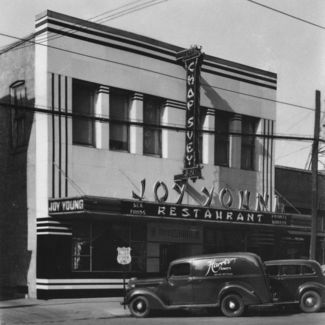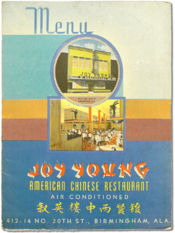Joy Young Restaurant: Difference between revisions
No edit summary |
No edit summary |
||
| Line 5: | Line 5: | ||
According to Kristen Lee, her great grandparents, a man and wife named "Joe" (zho-ee) were the first Chinese family to settle in Alabama, having arrived in the Port of Mobile in the late 1880s. With no knowledge of English, they struggled in their new home. In [[1919]] they were able to open a restaurant in the boom town of [[Birmingham]]. Another founder was known as [[Loo Bing]]. | According to Kristen Lee, her great grandparents, a man and wife named "Joe" (zho-ee) were the first Chinese family to settle in Alabama, having arrived in the Port of Mobile in the late 1880s. With no knowledge of English, they struggled in their new home. In [[1919]] they were able to open a restaurant in the boom town of [[Birmingham]]. Another founder was known as [[Loo Bing]]. | ||
In June [[1922]] the restaurant, owned by [[Joy Young]], moved to a new location, the former [[ | In June [[1922]] the restaurant, owned by [[Joy Young]], moved to a new location, the former [[Beaver's Cafe]] at 115 20th Street North. [[Thomas Willard]], a foreman for the [[Terry Showcase Company]], constructed the interior woodwork, including staircases, wainscoting and dining booths of gum and poplar with mahogany details. | ||
They earned a reputation as friendly, generous business owners, sometimes helping provide meals to the needy. That reputation served them well as the [[Ku Klux Klan]] found no support from the public in efforts to drive the restaurant out of business. | They earned a reputation as friendly, generous business owners, sometimes helping provide meals to the needy. That reputation served them well as the [[Ku Klux Klan]] found no support from the public in efforts to drive the restaurant out of business. In the mid-1920s the restaurant moved to its long-time location opposite the [[Tutwiler Hotel]]. | ||
Several varieties of "chop suey", "egg fooyoung", and "chow mein" dominated the portion of the menu labeled "Mandarin Style". The other half of the menu listed "American" favorites for less adventurous diners. The restaurant served seafood, poultry and meats with french fried or creamed potatoes, english peas and fried tomatoes, and club or chicken salad sandwiches | Several varieties of "chop suey", "egg fooyoung", and "chow mein" dominated the portion of the menu labeled "Mandarin Style". The other half of the menu listed "American" favorites for less adventurous diners. The restaurant served seafood, poultry and meats with french fried or creamed potatoes, english peas and fried tomatoes, and club or chicken salad sandwiches. | ||
[[Image:Joy Young menu sm.jpg|left|thumb|175px|A menu from [[1950]]]] | [[Image:Joy Young menu sm.jpg|left|thumb|175px|A menu from [[1950]]]] | ||
In advertisements of the 1930s the restaurant's manager is listed as [[Joe Mansion]]. In the [[1964]] city | In advertisements of the 1930s the restaurant's manager is listed as [[Joe Mansion]]. The restaurant was remodeled in [[1946]] with new electric kitchen equipment and refreshed dining rooms. The ''[[Birmingham News]]'' listed Joy Young's fried chicken (1/2 spring chicken, fried for $1.25 in [[1950]]) as the best in Birmingham. Some of the booths had curtains that could be drawn for privacy. The reviewing stand for the annual [[Veteran's Day Parade]] was usually directly across the street from Joy Young. | ||
Another major remodeling took place in [[1954]]. At the time the staff of 70 included, "a new master baker from Bremen, Germany, who will prepare new Bavarian dishes such as cakes, pies, rolls, for your added pleasure." | |||
In the [[1964]] city directory, the proprietor is listed as [[George Sai|George W. Sai]]. The restaurant's sign is visible in scenes from the 1976 film ''[[Stay Hungry]]''. Another "Joy Young" restaurant operated in Memphis. | |||
In the 1960s a new location on [[Highland Avenue]] opened as '''New Joy Young Restaurant'''. Later, several years after the [[Tutwiler Hotel (1914)|original Tutwiler Hotel]] across the street was demolished, the original Joy Young closed its doors. Owner [[Henry Joe]] reopened in the [[Brookwood Gallery]], a retail strip on the ground floor of the [[Brookwood Medical Center]] parking deck where it operated until the late 1980s. | In the 1960s a new location on [[Highland Avenue]] opened as '''New Joy Young Restaurant'''. Later, several years after the [[Tutwiler Hotel (1914)|original Tutwiler Hotel]] across the street was demolished, the original Joy Young closed its doors. Owner [[Henry Joe]] reopened in the [[Brookwood Gallery]], a retail strip on the ground floor of the [[Brookwood Medical Center]] parking deck where it operated until the late 1980s. | ||
Revision as of 13:13, 15 March 2020

Joy Young Restaurant was a landmark Chinese restaurant at 412-414 20th Street North.
According to Kristen Lee, her great grandparents, a man and wife named "Joe" (zho-ee) were the first Chinese family to settle in Alabama, having arrived in the Port of Mobile in the late 1880s. With no knowledge of English, they struggled in their new home. In 1919 they were able to open a restaurant in the boom town of Birmingham. Another founder was known as Loo Bing.
In June 1922 the restaurant, owned by Joy Young, moved to a new location, the former Beaver's Cafe at 115 20th Street North. Thomas Willard, a foreman for the Terry Showcase Company, constructed the interior woodwork, including staircases, wainscoting and dining booths of gum and poplar with mahogany details.
They earned a reputation as friendly, generous business owners, sometimes helping provide meals to the needy. That reputation served them well as the Ku Klux Klan found no support from the public in efforts to drive the restaurant out of business. In the mid-1920s the restaurant moved to its long-time location opposite the Tutwiler Hotel.
Several varieties of "chop suey", "egg fooyoung", and "chow mein" dominated the portion of the menu labeled "Mandarin Style". The other half of the menu listed "American" favorites for less adventurous diners. The restaurant served seafood, poultry and meats with french fried or creamed potatoes, english peas and fried tomatoes, and club or chicken salad sandwiches.

In advertisements of the 1930s the restaurant's manager is listed as Joe Mansion. The restaurant was remodeled in 1946 with new electric kitchen equipment and refreshed dining rooms. The Birmingham News listed Joy Young's fried chicken (1/2 spring chicken, fried for $1.25 in 1950) as the best in Birmingham. Some of the booths had curtains that could be drawn for privacy. The reviewing stand for the annual Veteran's Day Parade was usually directly across the street from Joy Young. Another major remodeling took place in 1954. At the time the staff of 70 included, "a new master baker from Bremen, Germany, who will prepare new Bavarian dishes such as cakes, pies, rolls, for your added pleasure."
In the 1964 city directory, the proprietor is listed as George W. Sai. The restaurant's sign is visible in scenes from the 1976 film Stay Hungry. Another "Joy Young" restaurant operated in Memphis.
In the 1960s a new location on Highland Avenue opened as New Joy Young Restaurant. Later, several years after the original Tutwiler Hotel across the street was demolished, the original Joy Young closed its doors. Owner Henry Joe reopened in the Brookwood Gallery, a retail strip on the ground floor of the Brookwood Medical Center parking deck where it operated until the late 1980s.
Joy Young ended its life as a take-out egg roll store in Pelham. Some have noted that the egg rolls and other dishes at the Chop Suey Inn on Green Springs Highway in Homewood are unmistakably similar to Joy Young's.
External link
- 1970s photo of marquee on Flickr.com
References
- "New Chinese Restaurant" (June 1922) The Birmingham News
- Lee, Kristen. "I Come from a Family that is Considered 'White'" Newsletter of the Asian Student Union at San Francisco State University. [1] - accessed March 27, 2006
- Angell, Glory Clark (1983) Birmingham Inside Out Birmingham: self published.
- State of Alabama Department of Revenue vs. New Joy Young Restaurant, Inc. State of Alabama Dept. of Revenue Administrative Law Division. Docket No. S. 91-246. "Final Order" - [2] - accessed March 27, 2006
